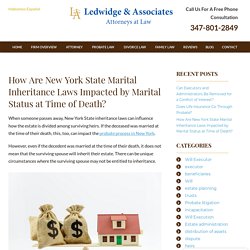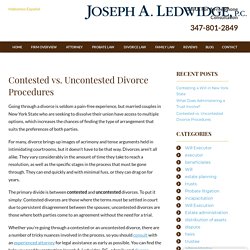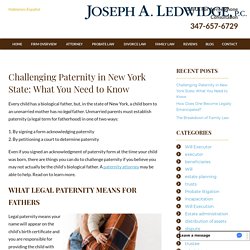

Joseph A. Ledwidge PC - Jamaica
At the law offices of Joseph A. Ledwidge, P.C., we provide knowledgeable guidance and strong advocacy to clients facing probate and estate administration issues throughout Queens and all five boroughs of New York City. We have the experience and resources to represent you in all aspects of the probate process, handling your critical legal matters with the utmost care and attention to detail.
Can Executors and Administrators Be Removed for a Conflict of Interest? Does Life Insurance Go Through Probate? How Are New York State Marital Inheritance Laws Impacted by Marital Status at Time of Death? When someone passes away, New York State inheritance laws can influence how the estate is divided among surviving heirs.

If the deceased was married at the time of their death, this, too, can impact the probate process in New York. However, even if the decedent was married at the time of their death, it does not mean that the surviving spouse will inherit their estate. There can be unique circumstances where the surviving spouse may not be entitled to inheritance. What Is Legal Separation in New York? When a married couple is having marital issues but they are not sure if divorce is the answer to their problems, they can choose a legal separation in New York.

Getting a legal separation is also beneficial when the couple cannot financially afford to get a divorce, for religious reasons, or to continue to enjoy financial benefits like joint tax returns and health insurance. A couple is not legally separated just because one person moves out of the marital home or the couple starts living separate and apart lives while remaining in the same home. Living separate and apart means each person is living their own life without the normal obligations associated with being married like sleeping in the same bedroom and being intimate with each other. In other words, the couple essentially becomes roommates who have their own separate lives.
How to Remove an Executor: Removing an Executor of an Estate in New York. An executor of an estate has an important role to oversee the last will and testament of the deceased person who wrote the will.

Often, the testator, the person who wrote the will, names an executor during the will and estate planning process. Sometimes, the testator will have asked the person named as executor if they want to perform the duties and responsibilities this role requires. Other times, the named executor may have no idea they were given this task. Regardless of whether executor knew ahead of time or after the death of the testator, as long as they are able to carry out the required duties, then they are not easily removed.
These duties include, but may not be limited to: Contested vs. Uncontested Divorce Procedures. Going through a divorce is seldom a pain-free experience, but married couples in New York State who are seeking to dissolve their union have access to multiple options, which increases the chances of finding the type of arrangement that suits the preferences of both parties.

For many, divorce brings up images of acrimony and tense arguments held in intimidating courtrooms, but it doesn’t have to be that way. Divorces aren’t all alike. They vary considerably in the amount of time they take to reach a resolution, as well as the specific stages in the process that must be gone through. They can end quickly and with minimal fuss, or they can drag on for years. The primary divide is between contested and uncontested divorces. Whether you’re going through a contested or an uncontested divorce, there are a number of tricky nuances involved in the process, so you should consult with an experienced attorney for legal assistance as early as possible.
Contesting a Will in New York State. If you believe a will isn’t valid, you may be able to contest it.

This means challenging it after it’s submitted to the court for approval. Planning a Destination Wedding? How to Make Sure Your Marriage Is Legal in the U.S. It’s not hard to see why destination weddings are so popular.

Getting married abroad is romantic and adventurous. It’s a chance to live out your wedding fantasy—whether it’s getting married like royalty in a medieval castle or barefoot on a white sand beach. A destination wedding is a vacation and a wedding rolled into one, with your most cherished friends and family members present. There’s a lot more to planning a destination wedding than booking a venue and making travel arrangements, though. If you plan to tie the knot in another country, you need to make sure you understand and comply with the rules and requirements of that country and your own. Here are some important things to know about getting married overseas. The U.S. doesn’t recognize all marriages performed abroad. Are Retirement Accounts and Life Insurance Part of Probate, and Do I Need a Will or Trust? Listing a beneficiary(s) on retirement and life insurance accounts is not only smart, but many financial institutions require it.

It’s common to ask: If I’ve named beneficiaries, do I really need to go to the trouble of creating a will or trust to avoid probate and the possibility of needing a New York probate attorney? The answer is: In most cases, yes. Read on to learn why. Challenging Paternity in New York State: What You Need to Know. Every child has a biological father, but, in the state of New York, a child born to an unmarried mother has no legal father.

Unmarried parents must establish paternity (a legal term for fatherhood) in one of two ways: 1. By signing a form acknowledging paternity 2. Deceased Relative Debts: Who Is Responsible? A loved one’s death is a significant loss that, if you are responsible in some way for their wills and estates, can also leave you with the job of sorting out their final accounts.

Many have discovered debts in their loved one’s name, which need to be repaid. What Happens to a Joint Account When One of the Owners Dies? Holding a joint account can make a lot of financial sense in certain situations.

Although joint bank accounts carry with them some potential for misuse, the convenience and benefits they offer generally far outweigh the risks.